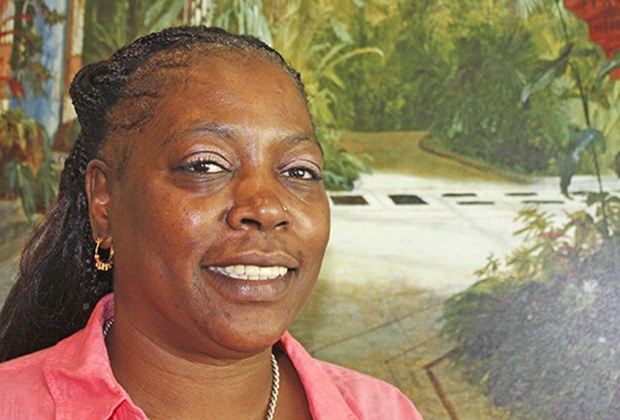Sexually assaulted as a child, Ernestine Finkley’s adult life would be ripped by domestic violence, shredded by unshakable substance abuse, savaged by mental health problems.
Convinced the misery was all of her own making, the Auburn woman descended into a maelstrom of guilt and shame.
Rage and despair pushed her to the edge — twice, she tried to kill herself.
“I had nowhere to go,” Finkley said.
Anger and drugs led to a series of run-ins with the law, ending with eight months in King County lockup for domestic violence.
The prospect of endless days in a jail cell rattled Finkley.
“I was shook in the beginning because I didn’t know what was going to happen to me,” said Finkley, a wife and mother of three grown children. “As time went on, I had to make a decision. Do I continue to live with my behavior? I had a lot of time to think. I had nowhere to go.”
Then Finkley’s broken life took an unexpected turn. Professionals, notably therapists and counselors from Sound Mental Health (SMH), stepped in with a better diagnosis for the emotionally-torn woman, and the means to put her life together.
Recovery was a tough road, but at 51, Ernestine Finkley defied the odds.
At first she resented and resisted the court-ordered treatment program. Ultimately, and reluctantly, she took the necessary, painful, steps to become a rare success story.
Finkley grudgingly came to grips with her own plight.
“They helped me meet this lady, Ernestine,” she said of SMH’s approach. “It was a lot of work. It was hard, painful but I didn’t give up. I thought about where I came from. I didn’t want that life no more. I wanted to be a good example (for my family).”
Timi Fair, one of Finkley’s therapists, often treats 25 clients at one time. Of those patients, she says, about 20 percent make a successful recovery. But only a few cases, about 10 percent, come out of treatment with such glowing results.
“I saw something else in her, and so did everybody else in the program who worked with her,” Fair said. “I saw in Ernestine that she wanted to change.”
Finkley finally stared down her demons, and killed them.
“She’s a dragon slayer,” Fair said.
Under the watch of Fair and others, Finkley participated in and navigated a King County-funded SMH program – Sober Transitions and Recovery Today (START). After years of struggling, she got her life back on track.
The 18-month program provides intensive mental health and substance abuse treatment, with transitional housing for those coming out of jail settings. Finkley was in a clean and sober house for seven months, transitioned to her own apartment and then moved into subsidized housing.
Finkley was diagnosed with a bipolar disorder and post-traumatic stress disorder, the product of domestic violence relationships and childhood trauma. She soon got the medication she needed.
More remarkable is h ow Finkley stayed on the course for recovery while overcoming the loss of one of her sons, shot and killed during a dispute in Seattle.
Despite the woes, Finkley’s once-divided family joined friends, her church and the SMH support team to help her put her life in order.
“I was freed. I wouldn’t be here without Sound Mental Health,” Finkley said. “My life has changed dramatically.”
Now Finkley wants to reciprocate. She plans to become a peer counselor and help others face and overcome similar problems. The peer specialist is a certified professional who, having experienced his or her own recovery, helps others as they seek mental health and substance abuse support.
“I want to stay in touch with what got me here,” she said.
Finkley is an example of someone with a mental illness who has accepted help and change to rise up and become a productive mamber of society.
She is determined to succeed. She got that chance.
“Successful recovery happens for people every day,” said Steve McLean, SMH’s director of communications. “(Finkley’s case) is an incredibly inspirational story of recovery and redemption.”
Nervous but otherwise undaunted, Finkley spoke at SMH’s recent gala – an event dedicated to raising awareness about the mental health epidemic in today’s prisons and jails nationwide.
She shared her story and message with hundreds of others — that recovery is possible and people can change.


